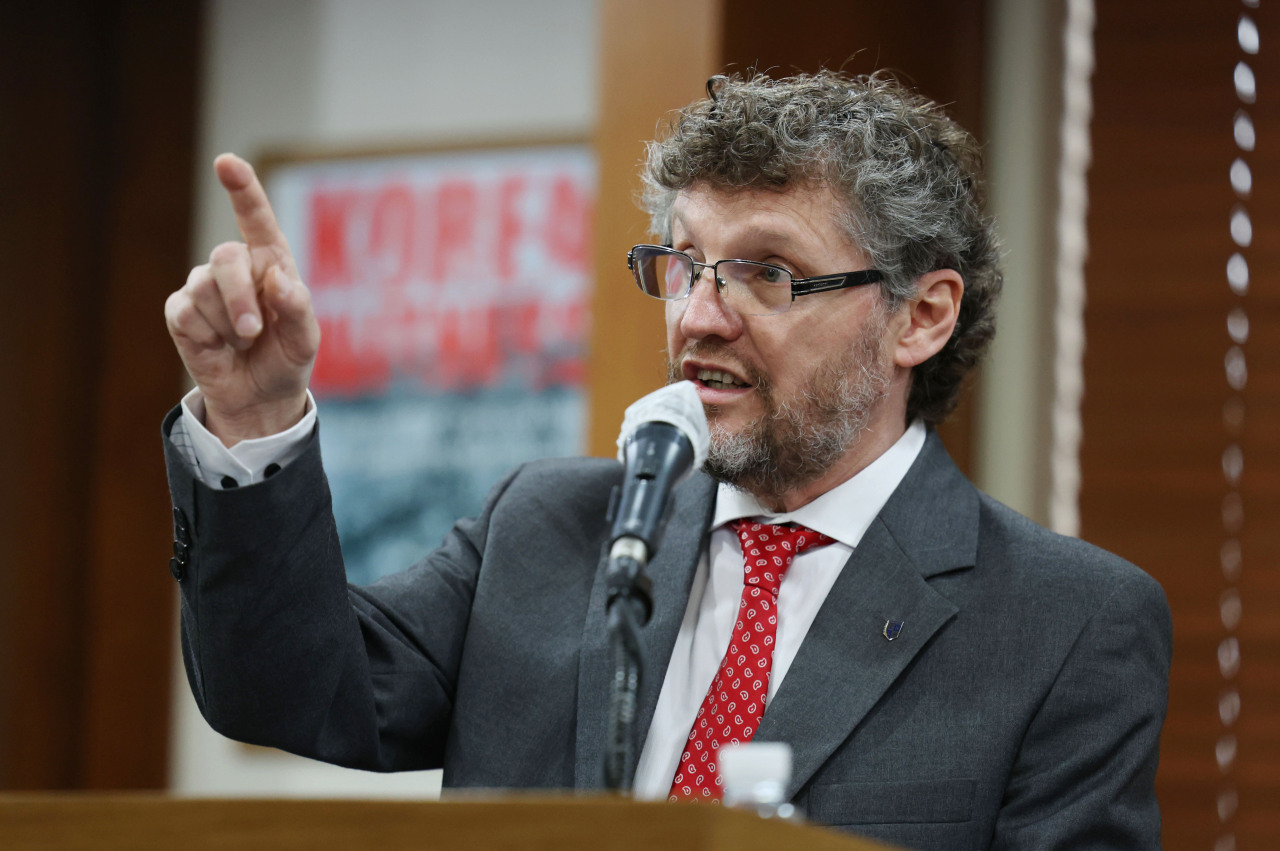UN expert calls for justice for victims of Japanese colonial rule, Korean War
By Kim ArinPublished : June 15, 2022 - 15:14

The United Nations special rapporteur on the promotion of truth, justice, reparation and guarantees, Fabian Salvioli, on Wednesday called for justice for victims of violations witnessed during Japanese colonial and Korean War times, as well as accountability from perpetrators.
At a press conference held Wednesday in Seoul, the UN expert discussed the “preliminary impressions” from his June 8-15 visit, and was careful not to bring a special focus to specific subjects or victims.
“I cannot advance any conclusions,” he said, adding that the findings and observations from his visit will be presented to the UN Human Rights Council in a report in September next year.
He said the report will have “diagnoses of the situations, and recommendations for all states,” not just South Korea. Many of the cases he looked into during his visit -- such as sexual slavery of women and girls by colonial Japan and North Korean abductions during and after the Korean War -- involved third states and entities.
He said he would “call on the authorities of those countries to assist in providing access to truth, accountability, reparation, and memorialization” of the harm suffered by victims.
He said the violations suffered by Korean society over the course of the 20th century were vast, and that the “sheer number of atrocities and people affected by them” made his work “titanic,” but “more than anything, vital” for reconciliation.
“A succession of autocratic and dictatorial regimes ruled the country from 1948 until 1990,” he said. Throughout that succession Korean people were exposed to “numerous and diverse forms of gross violations of human rights and humanitarian law at the hands of different actors and political entities.”
He said most of these violations have been “left unaddressed for decades while the country continued to battle with conflicts and authoritarianism.”
He said while he found South Korea has adopted some measures to “redress the longstanding grievances of victims” and their “longing for healing,” they did not amount to the kind of approach that could “adequately respond to the demands.”
He said that in limited forms there have been efforts at national and municipal levels for truth-seeking, memorialization and reparation for victims, but that they needed “scaling up.”
More specifically, he said South Korea “did not embark on an accountability process to investigate, prosecute and sanction the perpetrators of the aforementioned serious human rights violations.”
No national program has been adopted to allow victims to receive compensation without litigation, he noted. Oftentimes victims also lacked access to documents and archives of the government entities accused of involvement in the violations.
Still yet to come were official apologies to the victims. Official apologies to the victims should be provided in full consultation with them regarding the content, scope and format of the apology, and then publicly recorded.
Throughout the process victims needed to be engaged. He said the 2015 agreement between South Korea and Japan on the issue of “comfort women” or sexual slavery by the colonial Japanese army was concluded without victims’ assent, leaving their demands unaddressed.
At the start of his visit he had said his aim was to review initiatives and practices undertaken by South Korean authorities in response to “serious violations of human rights and humanitarian law committed during the periods of colonial rule, war and dictatorial regimes, and provide recommendations.”
Over nine days he met with several ministries, public human rights watchdogs, the police agency, members of the parliament and the judiciary, representatives of the international community as well as victims, their families and civic organizations helping them. He also made field visits to former detention camps, mass graves and other sites.
He said from his meetings with victims the phrase he heard repeatedly was, “‘I want to restore my honor.’”
“Honor is a main issue (in Korea) and it’s time to do it,” he said.
Providing Korean victims with effective responses and restoring their honor was an urgent task, he said, because most of them were already at an advanced age. “The government should spare no time or resources, and respond to the grievances without delay,” he said.
He went on, “I would like to acknowledge the suffering of victims, their families, and pay my sincere respect to each and every one of them. ... Not one tragedy or one victim should continue to go unrecognized. Nonrecurrence relies strongly on acknowledging the past.”
By Kim Arin (arin@heraldcorp.com)



![[Exclusive] Korean military set to ban iPhones over 'security' concerns](http://res.heraldm.com/phpwas/restmb_idxmake.php?idx=644&simg=/content/image/2024/04/23/20240423050599_0.jpg&u=20240423183955)
![[AtoZ into Korean mind] Humor in Korea: Navigating the line between what's funny and not](http://res.heraldm.com/phpwas/restmb_idxmake.php?idx=644&simg=/content/image/2024/04/22/20240422050642_0.jpg&u=)



![[Graphic News] 77% of young Koreans still financially dependent](http://res.heraldm.com/phpwas/restmb_idxmake.php?idx=644&simg=/content/image/2024/04/22/20240422050762_0.gif&u=)

![[Herald Interview] Why Toss invited hackers to penetrate its system](http://res.heraldm.com/phpwas/restmb_idxmake.php?idx=644&simg=/content/image/2024/04/22/20240422050569_0.jpg&u=20240422150649)





![[Exclusive] Korean military to ban iPhones over security issues](http://res.heraldm.com/phpwas/restmb_idxmake.php?idx=652&simg=/content/image/2024/04/23/20240423050599_0.jpg&u=20240423183955)



![[Today’s K-pop] Ateez confirms US tour details](http://res.heraldm.com/phpwas/restmb_idxmake.php?idx=642&simg=/content/image/2024/04/23/20240423050700_0.jpg&u=)